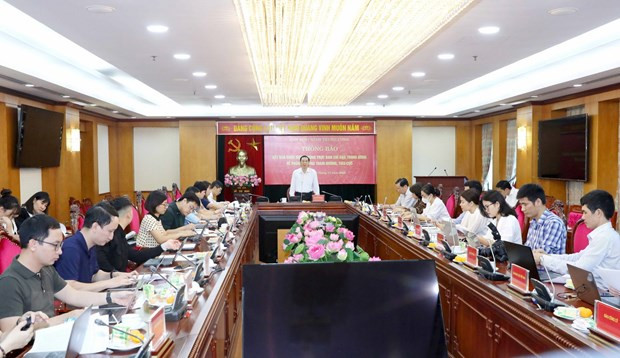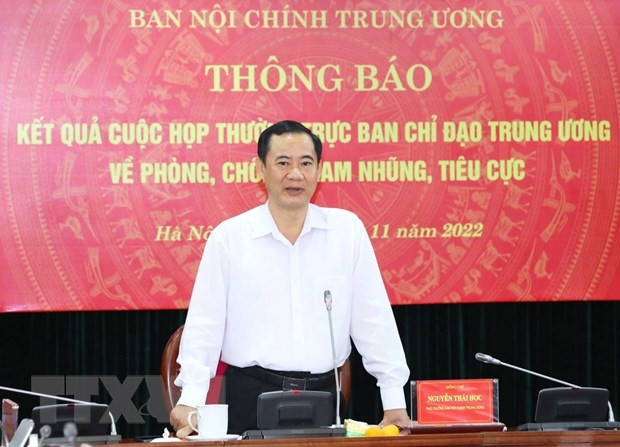Deputy Head of the Central Internal Affairs Commission Nguyen Thai Hoc answered the press about the case that occurred at Van Thinh Phat Group, Viet A Company as well as the case related to Nguyen Thi Thanh Nhan - former Chairwoman of AIC.

Meeting scene. (Photo: Phuong Hoa/VNA)
On the afternoon of November 18, the Central Internal Affairs Committee held a press conference to announce the results of the Standing Committee meeting of the Central Steering Committee on preventing and combating corruption and negativity.
At the press conference, Deputy Head of the Central Internal Affairs Commission Nguyen Thai Hoc said that in the morning of the same day, in Hanoi, the Standing Committee of the Central Steering Committee on Anti-Corruption and Negative Matters held a meeting chaired by General Secretary Nguyen Phu Trong, Head of the Steering Committee to discuss and give opinions on three contents: the results of the direction and handling of a number of cases and incidents under the supervision and direction of the Steering Committee since the 21st Session up to now; the results of the inspection of the leadership, direction, and organization of the work of detecting, transferring, receiving, and handling denunciations and reports of crimes, recommending the prosecution of cases with signs of crimes related to corruption, economic crimes, and negative matters, the work of appraisal and valuation of assets in the settlement of corruption, economic crimes, and negative matters; the situation and results of the establishment and operation of the Steering Committee for Anti-Corruption and Negative Matters in provinces and centrally run cities.
According to Mr. Nguyen Thai Hoc, at the meeting, the Standing Committee of the Steering Committee agreed that since the 21st Session (January 2022) of the Steering Committee up to now, although there are still many difficulties, the work of fighting corruption and negativity continues to be focused on leadership, direction and promoted, with new developments.
The work of building and perfecting institutions and laws to meet the requirements of the fight against corruption has been enhanced. The work of inspection, supervision, auditing and monitoring continues to be promoted.
The Politburo and the Secretariat have organized 11 inspection delegations to inspect the implementation of the Resolution of the 13th National Party Congress and the implementation of the Resolution of the 12th Central Committee, Session 4, on Party building and rectification, regulations on what party members are not allowed to do, and regulations on exemplary responsibility.
The Central Steering Committee on Anti-Corruption and Negative Matters organized 8 inspection teams to inspect the work of detecting, transferring, receiving, and handling information about crimes and the work of appraising and valuing assets in resolving corruption, economic, and negative cases.
The Central Inspection Committee has focused on inspecting and handling party organizations and party members with signs of violations in cases and incidents under the supervision and direction of the Steering Committee.
To date, 63 provinces and cities have established provincial Steering Committees for the prevention and fight against corruption and negativity. According to Mr. Nguyen Thai Hoc, the establishment of provincial Steering Committees is a correct and effective policy, gradually overcoming the situation of "hot above, cold below" because the Central Government does what the provinces do, and if the Central Government is determined, the provinces are determined.
Inspection and auditing work has been strengthened, especially in areas prone to corruption and negativity. In addition, major cases of public concern continue to be investigated, in which a large number of functional agencies have been mobilized, focusing on unified direction and promoting capacity and intelligence to promptly detect and handle. The close coordination between inspection, examination, prosecution and trial is increasingly tight and smooth.
Also according to Mr. Nguyen Thai Hoc, at the meeting of the Steering Committee, there were many opinions that the fight against corruption and negativity is continuous and has made new breakthroughs in the detection and strict handling of many large and complicated cases that have never been seen before. The recent major cases showed that the subjects were correct, the nature was correct, and civil and economic relations were not criminalized; the subjects all sincerely admitted and declared.
"Previously, it was extremely difficult to prove bribery and bribe-taking, but many recent cases have shown that the defendants have honestly confessed and returned the money they received. Thereby, the fight has gradually gone into the essence of the problem, into the right subjects, without wrongful convictions. This is a step forward, through cases to gain experience in the fight against corruption," the Deputy Head of the Central Internal Affairs Commission emphasized.
Speed up the processing of Viet A case
Responding to press questions regarding the case that occurred at Van Thinh Phat Group, according to the Deputy Head of the Central Internal Affairs Commission, this case has been included in the list of cases monitored and directed by the Central Steering Committee on Anti-Corruption and Negativity.
"The Standing Committee of the Steering Committee believes that the violations related to Van Thinh Phat Group are particularly serious and complicated, occurring over a long period of time," Mr. Nguyen Thai Hoc emphasized. The Standing Committee of the Steering Committee assigned the relevant agencies to clarify and handle the matter.

Responding to the press regarding the case of Nguyen Thi Thanh Nhan (former Chairwoman of AIC International Progress Joint Stock Company, who is on the run), Deputy Head of the Central Internal Affairs Committee Nguyen Thai Hoc said that the Central Steering Committee on preventing and combating corruption and negativity has assigned the prosecution agencies to study legal regulations to prosecute and try the suspects and defendants in accordance with the law.
"If the suspect or defendant flees abroad and the law allows for a trial in absentia, the case can still be tried in absentia," said Mr. Nguyen Thai Hoc, citing Clause 2, Article 290 of the Criminal Procedure Code. Specifically, Clause 2, Article 290 stipulates that the court can try the defendant in absentia in cases where "the defendant flees and the search has no results."
From there, Mr. Nguyen Thai Hoc emphasized that the law violator has been prosecuted and investigated but the subject has fled abroad, the wanted person has no results, if there is sufficient basis and evidence, then apply the provisions of the law to handle.
Regarding the case at Viet A Company, Deputy Head of the Central Internal Affairs Commission Nguyen Thai Hoc said that he is focusing on directing the case decisively but on a very large scale, involving many subjects and involving cadres and party members; the review and handling process requires urgency but caution, assessing the context and situation leading to violations and division.
According to Mr. Nguyen Thai Hoc, the Politburo recently concluded a policy of differentiation in the process of disciplinary action against cadres and party members. The Politburo's conclusion is the basis, guideline, and policy for analyzing subjects to be strictly punished, subjects to be leniently punished... In the process of criminal proceedings, the competent authorities analyze and evaluate the case comprehensively to consider aggravating circumstances, mitigating circumstances, lenient circumstances...
"Currently, the Central and local governments are researching and speeding up the process to handle the situation. The Steering Committee's policy is to quickly complete the handling process," said the Deputy Head of the Central Internal Affairs Committee.
According to Vietnam+